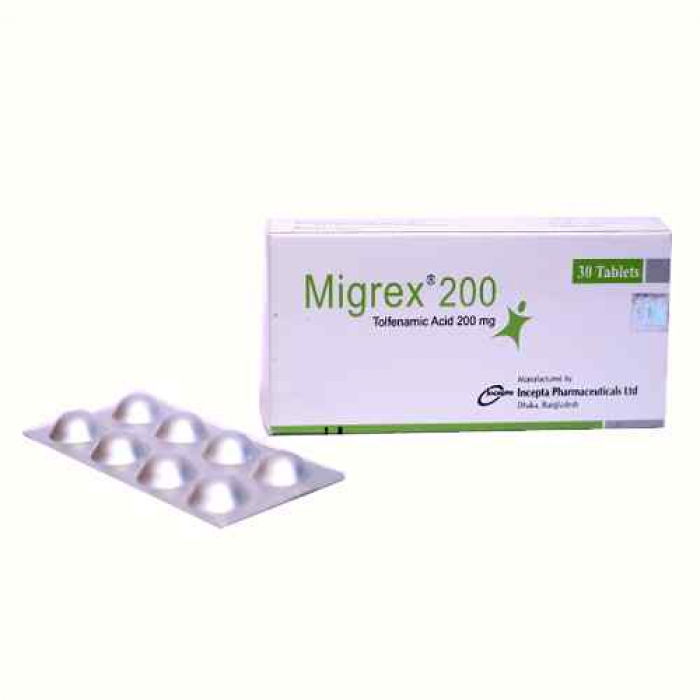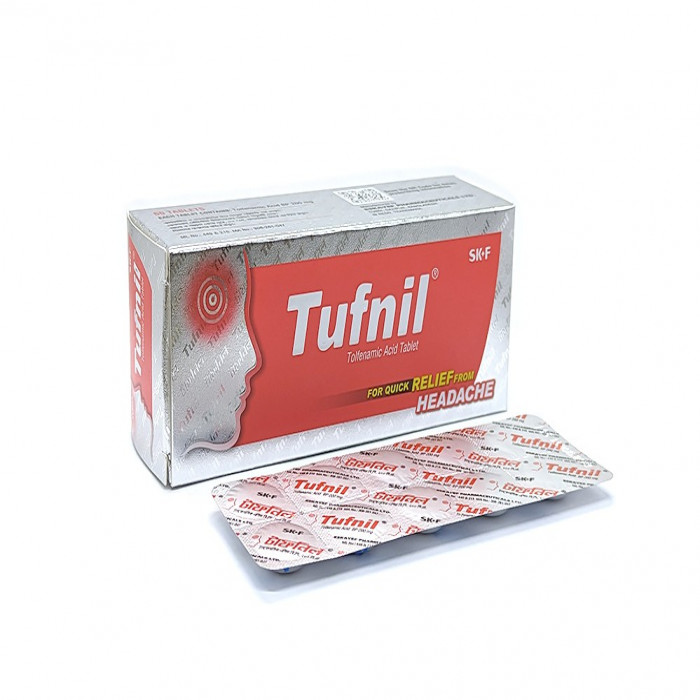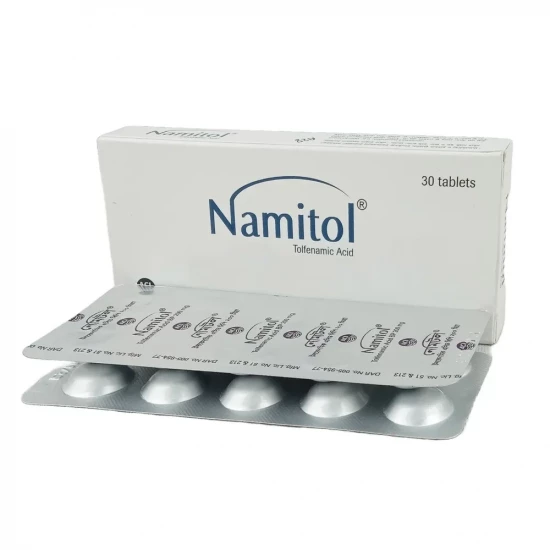
✔ 100% Authentic Product
👁️ Currently Viewing 4456
Migrex 200mg Tablet 10pcs
Tolfenamic acid, the active ingredient, has anti-inflammatory, analgesic, and antipyretic effects.
Discount
Price: ৳ 95
MRP:
৳
100
5%
Off

100% Genuine Products, Guaranteed

Safe & Secure Payments, Always

Fast, Secure & Efficient Delivery

Proper Packaging
 Cash on Delivery - All over Bangladesh
Cash on Delivery - All over Bangladesh Regular Delivery - 12-24 Hours, Dhaka City* Charge Tk.39-59
Regular Delivery - 12-24 Hours, Dhaka City* Charge Tk.39-59 Regular Delivery - 24-48 Hours, Other Cities* Charge Tk.99-110
Regular Delivery - 24-48 Hours, Other Cities* Charge Tk.99-110
🌙 রমযান অফার 🌙
 ফ্রি ডেলিভারিঃ - ৭৯৯ টাকা+ অর্ডারে, ঢাকা
শহরে
ফ্রি ডেলিভারিঃ - ৭৯৯ টাকা+ অর্ডারে, ঢাকা
শহরে ফ্রি ডেলিভারিঃ - ২৭৯৯ টাকা+ অর্ডারে, ঢাকার
বাহিরে
ফ্রি ডেলিভারিঃ - ২৭৯৯ টাকা+ অর্ডারে, ঢাকার
বাহিরে
📲 মোবাইল অ্যাপ অর্ডারে সাশ্রয় বেশী
-
Google Play Store থেকে ডাউনলোড
-
Apple Store থেকে ডাউনলোড
100% Genuine Products, Guaranteed
Safe & Secure Payments, Always
Fast, Secure & Efficient Delivery
Proper Packaging
 Cash on Delivery - All over Bangladesh
Cash on Delivery - All over Bangladesh Regular Delivery - 12-24 Hours, Dhaka City* Charge Tk.39-59
Regular Delivery - 12-24 Hours, Dhaka City* Charge Tk.39-59 Regular Delivery - 24-48 Hours, Other Cities* Charge Tk.99-110
Regular Delivery - 24-48 Hours, Other Cities* Charge Tk.99-110 ফ্রি ডেলিভারিঃ - ৭৯৯ টাকা+ অর্ডারে, ঢাকা
শহরে
ফ্রি ডেলিভারিঃ - ৭৯৯ টাকা+ অর্ডারে, ঢাকা
শহরে ফ্রি ডেলিভারিঃ - ২৭৯৯ টাকা+ অর্ডারে, ঢাকার
বাহিরে
ফ্রি ডেলিভারিঃ - ২৭৯৯ টাকা+ অর্ডারে, ঢাকার
বাহিরে- Google Play Store থেকে ডাউনলোড
- Apple Store থেকে ডাউনলোড
🌙 রমযান অফার 🌙
📲 মোবাইল অ্যাপ অর্ডারে সাশ্রয় বেশী
✅ Description:
A migraine is a severe headache characterized by throbbing or pulsating pain, usually on one side of the head, along with symptoms like nausea, vomiting, and extreme sensitivity to light and sound.
Migrex 200 contains Tolfenamic Acid, which belongs to the group of medicines called Non-steroidal anti-inflammatory drugs (NSAIDs). It is used in adults to manage pain associated with an acute attack of migraine.
Migrex 200 is not recommended for use in patients with severe liver, kidney, or heart disease, a history of recurrent bleeding or ulcers in the stomach or intestine, or a history of bleeding or perforation in the digestive tract due to the use of NSAIDs.
Migrex 200 should be taken with caution in patients with conditions such as lung disease (asthma), decreased heart, liver, or kidney function, peripheral arterial disease, cerebrovascular disease, peptic ulcer, intestinal bleeding or perforation, high blood pressure, gastrointestinal disease (such as Crohn’s disease or inflammation of the colon and rectum), systemic lupus erythematosus, diabetes, raised cholesterol or triglyceride levels, or if you have a smoking habit.
Safety Advices

Alcohol
UNSAFE
Avoid consuming alcohol while using Migrex 200.

Pregnancy
CONSULT YOUR DOCTOR
Migrex 200 may be unsafe during pregnancy. Consult your doctor for advice before using this medicine.

Breastfeeding
CONSULT YOUR DOCTOR
Information regarding the use of Migrex 200 during breastfeeding is not available. Please consult your doctor.

Driving
CAUTION
Migrex 200 may decrease alertness, affect vision, or cause drowsiness and dizziness. Avoid driving if you experience these symptoms.

Kidney
CONSULT YOUR DOCTOR
Use Migrex 200 with caution in patients with kidney disease. Dose adjustment may be necessary. Regular monitoring of kidney function tests is advised.

Liver
CONSULT YOUR DOCTOR
Use Migrex 200 with caution in patients with liver disease. Dose adjustment may be necessary. Consult your doctor.
✔️ Uses of Migrex 200
- Treat mild to moderate pain, and acute migraine attacks.
✔️ How does Migrex 200 work?
Migrex 200 is a non-steroidal anti-inflammatory drug (NSAID) that blocks the release of certain chemical messengers responsible for fever, pain, and inflammation.
✔️ Side Effects of Migrex 200
Common side effects include diarrhea, nausea, vomiting, dyspepsia, headache, tremor, euphoria, fatigue, pulmonary infiltration, and hematuria, especially in males. Blood dyscrasias and hepatitis are rare but serious.
✔️ Quick Suggestions:
- Take Migrex 200 with food or milk to prevent stomach upset.
- Long-term use of Migrex 200 can lead to serious complications like stomach bleeding and kidney problems.
- Inform your doctor if you are pregnant, planning to conceive, or breastfeeding.
- Inform your doctor about any history of kidney or liver problems.
✔️ Indications:
Tolfenamic acid is indicated for the treatment of migraine headaches and as an analgesic for post-operative pain and fever.
✔️ Pharmacology
Tolfenamic acid, also known as N-(2-methyl-3-chlorophenyl) anthranilic acid, belongs to the fenamate class. It inhibits the production of inflammatory mediators like thromboxane (TX) B2 and prostaglandin (PG) E2, which are responsible for swelling, pain, and inflammation. It acts by directly antagonizing receptors and reducing prostaglandin synthesis.
✔️ Dosage & Administration of Migrex 200
For adults, the dosage for acute migraine attacks is 200 mg at symptom onset, with a possible repeat dose after 1-2 hours. For mild to moderate pain, the dose ranges from 100-200 mg three times daily. Adjustments may be necessary for renal impairment, while severe impairment warrants avoidance. There's no established pediatric dosage regimen. Tolfenamic acid should be taken with food and accompanied by water during or after meals.
✔️ Interaction
Metoclopramide and magnesium hydroxide increase tolfenamic acid absorption, while aluminum hydroxide decreases it. Concurrent use with anticoagulants and other NSAIDs increases bleeding risk. It reduces the antihypertensive effects of loop diuretics, beta-blockers, and ACE inhibitors. Co-administration elevates blood levels of lithium, methotrexate, and cardiac glycosides. When combined with ACE inhibitors, ciclosporin, tacrolimus, or diuretics, there's an increased risk of nephrotoxicity.
✔️ Contraindications
Tolfenamic acid is contraindicated in active or bleeding peptic ulcers, and severe heart, kidney, or liver failure.
✔️ Pregnancy & Lactation
Avoid use during pregnancy, particularly in the third trimester, unless deemed necessary. NSAIDs may be present in breast milk at low levels, so caution is advised during breastfeeding.
✔️ Precautions & Warnings
Exercise caution in patients with asthma, bronchospasm, blood disorders, cardiovascular diseases, peptic ulcers, hypertension, liver infection, or renal/cardiac impairment. Increased water intake or dose reduction may minimize dysuria.
✔️ Storage Conditions:
Store in a cool, dry place away from light, and keep out of reach of children.
⚠️Disclaimer:
At ePharma, we’re committed to providing accurate and accessible health information. However, all content is intended for informational purposes only and should not replace medical advice from a qualified physician. Please consult your healthcare provider for personalized guidance. We aim to support, not substitute, the doctor-patient relationship.








